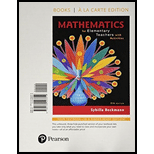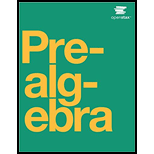
Mathematics for Elementary Teachers with Activities, Loose-Leaf Version Plus MyLab Math -- Access Card Package (5th Edition)
5th Edition
ISBN: 9780134800196
Author: Sybilla Beckmann
Publisher: PEARSON
expand_more
expand_more
format_list_bulleted
Textbook Question
Chapter 12.9, Problem 6P
Use the Pythagorean theorem to help you determine the area of an equilateral triangle with sides of length 1 unit. Explain your reasoning.
Expert Solution & Answer
Want to see the full answer?
Check out a sample textbook solution
Students have asked these similar questions
Temperature measurements are based on the transfer of heat between the sensor of a measuring device (such as an ordinary thermometer or the gasket of a thermocouple) and the medium whose temperature is to be measured. Once the sensor or thermometer is brought into contact with the medium, the sensor quickly receives (or loses, if warmer) heat and reaches thermal equilibrium with the medium. At that point the medium and the sensor are at the same temperature. The time required for thermal equilibrium to be established can vary from a fraction of a second to several minutes. Due to its small size and high conductivity it can be assumed that the sensor is at a uniform temperature at all times, and Newton's cooling law is applicable. Thermocouples are commonly used to measure the temperature of gas streams. The characteristics of the thermocouple junction and the gas stream are such that λ = hA/mc 0.02s-1. Initially, the thermocouple junction is at a temperature Ti and the gas stream at…
A body of mass m at the top of a 100 m high tower is thrown vertically upward with an initial velocity of 10 m/s. Assume that the air resistance FD acting on the body is proportional to the velocity V, so that FD=kV. Taking g = 9.75 m/s2 and k/m = 5 s, determine: a) what height the body will reach at the top of the tower, b) how long it will take the body to touch the ground, and c) the velocity of the body when it touches the ground.
A chemical reaction involving the interaction of two substances A and B to form a new compound X is called a second order reaction. In such cases it is observed that the rate of reaction (or the rate at which the new compound is formed) is proportional to the product of the remaining amounts of the two original substances. If a molecule of A and a molecule of B combine to form a molecule of X (i.e., the reaction equation is A + B ⮕ X), then the differential equation describing this specific reaction can be expressed as:
dx/dt = k(a-x)(b-x)
where k is a positive constant, a and b are the initial concentrations of the reactants A and B, respectively, and x(t) is the concentration of the new compound at any time t. Assuming that no amount of compound X is present at the start, obtain a relationship for x(t). What happens when t ⮕∞?
Chapter 12 Solutions
Mathematics for Elementary Teachers with Activities, Loose-Leaf Version Plus MyLab Math -- Access Card Package (5th Edition)
Ch. 12.1 - You have a 5-foot-by-7-foot rectangular rug in...Ch. 12.1 - Draw a 3-cm-by-7-cm rectangle. Then discuss the...Ch. 12.1 - a. Explain how to decompose the large rectangle in...Ch. 12.1 - a. Explain how to decompose the large rectangle in...Ch. 12.1 - Draw a (fairly long) line segment and designate it...Ch. 12.2 - Make a shape that has area 25in2 but that has no...Ch. 12.2 - Flgure 12.14 shows the floor plan for a one-story...Ch. 12.2 - An area problem: The Johnsons are planning to...Ch. 12.2 - Figure 12.15 shows a design for an herb garden,...Ch. 12.2 - Figure 12.16 [g shows the floor plan for a modern,...
Ch. 12.2 - Use the moving and additivity principles to...Ch. 12.2 - Use the moving and additivity principles to...Ch. 12.3 - Use the moving and additivity principles to...Ch. 12.3 - For each triangle in Figure 12.31 , show the...Ch. 12.3 - Use a ruler and compass to draw three identical...Ch. 12.3 - Explain clearly in your own words why the...Ch. 12.3 - Explain clearly in your own words why the...Ch. 12.3 - Becky was asked to divide a rectangle into 4 equal...Ch. 12.3 - Explain how to use the additivity principle to...Ch. 12.3 - Determine the area of the shaded triangle that is...Ch. 12.3 - Determine the area of the shaded shape in Figure...Ch. 12.3 - Determine the area of the shaded triangle in...Ch. 12.3 - Determine the area of the shaded shape in Figure...Ch. 12.3 - Determine the area of the shaded shape in Figure...Ch. 12.3 - Given that the rectangle ABCD in Figure 12.41 has...Ch. 12.4 - Josie has two wooden beams that are 15 feet long...Ch. 12.4 - Figure 12.47 shows a shaded parallelogram inside a...Ch. 12.4 - In the text, we saw a way to explain why the area...Ch. 12.4 - Figure 12.49 shows a trapezoid. This problem will...Ch. 12.4 - Use the moving and additivity principles to...Ch. 12.4 - Find a formula for the area of a rhombus (see...Ch. 12.4 - Determine the areas (in square units) of the 4...Ch. 12.4 - Determine the area (in square units) of the...Ch. 12.4 - Determine the area of the shaded shapes in Figure...Ch. 12.4 - A rug company weaves rugs that are made by...Ch. 12.4 - Determine the area of the shaded region in Figure...Ch. 12.4 - Given that the shaded shape in Figure 12.58 is a...Ch. 12.4 - Figure 12.59 shows a map of some land. Determine...Ch. 12.5 - Figure 12.68 shows a triangle on a pegboard....Ch. 12.5 - Make a drawing to show the result of shearing the...Ch. 12.5 - Prob. 3PCh. 12.5 - Make a drawing to show the result of shearing the...Ch. 12.5 - a. Make a drawing to show the result of shearing...Ch. 12.5 - The boundary between the Johnson and the Zhang...Ch. 12.5 - Suppose that in a trapezoid ABCD, as in Figure...Ch. 12.5 - Prob. 8PCh. 12.6 - In your own words. discuss how the diameter and...Ch. 12.6 - Tim works on the following exercise: For each...Ch. 12.6 - A large running track is constructed to have...Ch. 12.6 - Suppose you have a large spool used for winding...Ch. 12.6 - Suppose that when pizza dough is rolled out it...Ch. 12.6 - Lauriann and Kinsey are in charge of the annual...Ch. 12.6 - Penguins huddle together to stay warm in very cold...Ch. 12.6 - Jack has a truck that requires tires that are 26...Ch. 12.6 - Let r units denote the radius of each circle in...Ch. 12.7 - Suppose that you have a map on which 1 inch...Ch. 12.7 - Suppose that you have a map on which 1 inch...Ch. 12.7 - Suppose that you have a map on which 1 inch...Ch. 12.8 - Suppose that a student in your class wants to know...Ch. 12.8 - Sarah is confused about the difference between the...Ch. 12.8 - Describe a concrete way to demonstrate that many...Ch. 12.8 - Anya wants to draw many different rectangles that...Ch. 12.8 - On graph paper, draw 4 different rectangles that...Ch. 12.8 - Which of the lengths that follow could be the...Ch. 12.8 - a. Without using a calculator, fund the lengths...Ch. 12.8 - Draw 4 different rectangles, all of which have a...Ch. 12.8 - Draw 4 different rectangles, all of which have...Ch. 12.8 - A forest has a perimeter of 210 mi, but no...Ch. 12.8 - Bob wants to find the area of an irregular shape....Ch. 12.8 - Consider all rectangles whose area is 4 in2 ,...Ch. 12.9 - Jessica says she doesn‘t understand the...Ch. 12.9 - Town B is 380 km due south of town A. Town C is...Ch. 12.9 - What length ribbon will you need to stretch from...Ch. 12.9 - Rover the dog is on a 30-foot leash. One end of...Ch. 12.9 - Carmina and Antone measure that the distance...Ch. 12.9 - Use the Pythagorean theorem to help you determine...Ch. 12.9 - Assuming that the earth is a perfectly round,...
Additional Math Textbook Solutions
Find more solutions based on key concepts
Length of a Guy Wire A communications tower is located at the top of a steep hill, as shown. The angle of incli...
Precalculus: Mathematics for Calculus (Standalone Book)
The largest polynomial that divides evenly into a list of polynomials is called the _______.
Elementary & Intermediate Algebra
For Problems 23-28, write in simpler form, as in Example 4. logbFG
Finite Mathematics for Business, Economics, Life Sciences and Social Sciences
Teacher Salaries
The following data from several years ago represent salaries (in dollars) from a school distri...
Elementary Statistics: A Step By Step Approach
Knowledge Booster
Learn more about
Need a deep-dive on the concept behind this application? Look no further. Learn more about this topic, subject and related others by exploring similar questions and additional content below.Similar questions
- Consider a body of mass m dropped from rest at t = 0. The body falls under the influence of gravity, and the air resistance FD opposing the motion is assumed to be proportional to the square of the velocity, so that FD = kV2. Call x the vertical distance and take the positive direction of the x-axis downward, with origin at the initial position of the body. Obtain relationships for the velocity and position of the body as a function of time t.arrow_forwardAssuming that the rate of change of the price P of a certain commodity is proportional to the difference between demand D and supply S at any time t, the differential equations describing the price fluctuations with respect to time can be expressed as: dP/dt = k(D - s) where k is the proportionality constant whose value depends on the specific commodity. Solve the above differential equation by expressing supply and demand as simply linear functions of price in the form S = aP - b and D = e - fParrow_forwardFind the area of the surface obtained by rotating the circle x² + y² = r² about the line y = r.arrow_forward
- 3) Recall that the power set of a set A is the set of all subsets of A: PA = {S: SC A}. Prove the following proposition. АСВ РАСРВarrow_forwardA sequence X = (xn) is said to be a contractive sequence if there is a constant 0 < C < 1 so that for all n = N. - |Xn+1 − xn| ≤ C|Xn — Xn−1| -arrow_forward3) Find the surface area of z -1≤ y ≤1 = 1 + x + y + x2 over the rectangle −2 ≤ x ≤ 1 and - Solution: TYPE YOUR SOLUTION HERE! ALSO: Generate a plot of the surface in Mathematica and include that plot in your solution!arrow_forward
- 7. Walkabout. Does this graph have an Euler circuit? If so, find one. If not, explain why not.arrow_forwardBelow, let A, B, and C be sets. 1) Prove (AUB) nC = (ANC) U (BNC).arrow_forwardQ1: find the Reliability of component in the system in fig(1) by minimal cut method. Q2: A component A with constant failure rate 1.5 per 1000 h, B per to 2 in 1000h, A and B in parallel, find the Reliability system? [ by exponential distribution]. Q3: Give an example to find the minimal path and estimate the reliability of this block diagram. Q4: By Tie set method find the Reliability of fig (2) FUZarrow_forward
- A sequence X = (xn) is said to be a contractive sequence if there is a constant 0 < C < 1 so that for all n = N. - |Xn+1 − xn| ≤ C|Xn — Xn−1| -arrow_forward1) Suppose continuous random variable X has sample space S = [1, ∞) and a pdf of the form f(x) = Ce-(2-1)/2. What is the expected value of X?arrow_forwardA sequence X = (xn) is said to be a contractive sequence if there is a constant 0 < C < 1 so that for all n = N. - |Xn+1 − xn| ≤ C|Xn — Xn−1| -arrow_forward
arrow_back_ios
SEE MORE QUESTIONS
arrow_forward_ios
Recommended textbooks for you

 Holt Mcdougal Larson Pre-algebra: Student Edition...AlgebraISBN:9780547587776Author:HOLT MCDOUGALPublisher:HOLT MCDOUGAL
Holt Mcdougal Larson Pre-algebra: Student Edition...AlgebraISBN:9780547587776Author:HOLT MCDOUGALPublisher:HOLT MCDOUGAL Elementary Geometry For College Students, 7eGeometryISBN:9781337614085Author:Alexander, Daniel C.; Koeberlein, Geralyn M.Publisher:Cengage,
Elementary Geometry For College Students, 7eGeometryISBN:9781337614085Author:Alexander, Daniel C.; Koeberlein, Geralyn M.Publisher:Cengage, Elementary Geometry for College StudentsGeometryISBN:9781285195698Author:Daniel C. Alexander, Geralyn M. KoeberleinPublisher:Cengage Learning
Elementary Geometry for College StudentsGeometryISBN:9781285195698Author:Daniel C. Alexander, Geralyn M. KoeberleinPublisher:Cengage Learning Glencoe Algebra 1, Student Edition, 9780079039897...AlgebraISBN:9780079039897Author:CarterPublisher:McGraw Hill
Glencoe Algebra 1, Student Edition, 9780079039897...AlgebraISBN:9780079039897Author:CarterPublisher:McGraw Hill Elementary AlgebraAlgebraISBN:9780998625713Author:Lynn Marecek, MaryAnne Anthony-SmithPublisher:OpenStax - Rice University
Elementary AlgebraAlgebraISBN:9780998625713Author:Lynn Marecek, MaryAnne Anthony-SmithPublisher:OpenStax - Rice University


Holt Mcdougal Larson Pre-algebra: Student Edition...
Algebra
ISBN:9780547587776
Author:HOLT MCDOUGAL
Publisher:HOLT MCDOUGAL

Elementary Geometry For College Students, 7e
Geometry
ISBN:9781337614085
Author:Alexander, Daniel C.; Koeberlein, Geralyn M.
Publisher:Cengage,

Elementary Geometry for College Students
Geometry
ISBN:9781285195698
Author:Daniel C. Alexander, Geralyn M. Koeberlein
Publisher:Cengage Learning

Glencoe Algebra 1, Student Edition, 9780079039897...
Algebra
ISBN:9780079039897
Author:Carter
Publisher:McGraw Hill

Elementary Algebra
Algebra
ISBN:9780998625713
Author:Lynn Marecek, MaryAnne Anthony-Smith
Publisher:OpenStax - Rice University
An Introduction to Area | Teaching Maths | EasyTeaching; Author: EasyTeaching;https://www.youtube.com/watch?v=_uKKl8R1xBM;License: Standard YouTube License, CC-BY
Area of a Rectangle, Triangle, Circle & Sector, Trapezoid, Square, Parallelogram, Rhombus, Geometry; Author: The Organic Chemistry Tutor;https://www.youtube.com/watch?v=JnLDmw3bbuw;License: Standard YouTube License, CC-BY